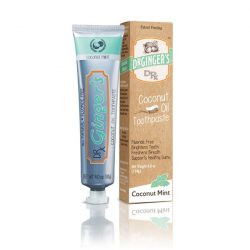Toothpaste & Coconut Oil Benefits

The practice of using coconut oil in oral care has gained significant attention in recent years, particularly when combined with toothpaste. This integration is rooted in the belief that coconut oil’s unique properties can enhance oral health beyond the capabilities of traditional toothpaste alone. To understand the potential benefits of combining toothpaste with coconut oil, it’s essential to delve into the properties of each and how they interact.
Coconut oil is renowned for its antimicrobial properties, primarily due to its high concentration of lauric acid. This fatty acid has been shown to combat bacteria, viruses, and fungi, making it a potent agent against oral pathogens. When used in conjunction with toothpaste, coconut oil may help in reducing the bacterial load in the mouth, potentially leading to healthier gums and teeth.
Historical Evolution of Coconut Oil in Oral Care
The use of coconut oil in oral hygiene is not a new practice. In ancient Indian medicine, particularly in Ayurveda, oils were used for “oil pulling,” a technique where oil is swished around the mouth to detoxify and clean teeth and gums. Coconut oil, with its pleasant taste and numerous health benefits, has become a popular choice for this practice. Its historical use underscores a long-standing belief in its oral health benefits, although modern science has only recently begun to explore these claims in depth.
Technical Breakdown: Coconut Oil’s Active Components
- Lauric Acid: This medium-chain fatty acid is the primary component of coconut oil responsible for its antimicrobial effects. Lauric acid has been shown to effectively combat Streptococcus mutans, a bacterium associated with tooth decay.
- Capric Acid and Caprylic Acid: These fatty acids also possess antimicrobial properties, contributing to the broad-spectrum antimicrobial activity of coconut oil.
- Vitamin E: An antioxidant that protects cells from damage caused by free radicals, potentially reducing inflammation and promoting healing in the oral cavity.
Decision Framework: Should You Use Coconut Oil with Your Toothpaste?
When considering the integration of coconut oil into your oral care routine, several factors should be weighed:
- Oral Health Status: Individuals with existing oral health issues may benefit from the antimicrobial properties of coconut oil.
- Toothpaste Ingredients: If your toothpaste lacks certain beneficial ingredients, coconut oil could provide a complementary effect.
- Personal Preference: Taste, texture, and the inconvenience of adding an extra step to your routine are personal factors to consider.
Comparative Analysis: Coconut Oil vs. Traditional Mouthwashes
While traditional mouthwashes are designed to kill bacteria and freshen breath, they often contain alcohol, which can dry out the mouth and potentially lead to other issues. Coconut oil, on the other hand, moisturizes the gums and has a more natural, chemical-free approach to oral health. However, the efficacy of coconut oil as a replacement for traditional mouthwash or toothpaste has not been conclusively proven and may vary from person to person.
Step-by-Step Guide to Using Coconut Oil with Toothpaste
- Select a High-Quality Coconut Oil: Choose a cold-pressed, virgin coconut oil to ensure you’re getting the most beneficial compounds.
- Brush Your Teeth: Use your regular toothpaste and brushing technique.
- Apply Coconut Oil: After brushing, apply a small amount of coconut oil to your teeth and gums. You can use your finger or a soft brush to apply it evenly.
- Swish and Spit: Swish the coconut oil around your mouth for about 10 minutes to allow the lauric acid to interact with your teeth and gums, then spit it out. Do not swallow.
- Rinse Thoroughly: Rinse your mouth with warm water to remove any remaining oil and bacteria.
Expert Insight
Combining coconut oil with toothpaste may offer enhanced oral health benefits due to the antimicrobial properties of coconut oil. However, it’s crucial to maintain regular dental check-ups and a balanced diet to ensure overall oral health. Coconut oil should be seen as a complementary tool rather than a replacement for standard oral hygiene practices.
Pro-Con Analysis
Pros: - Natural and Chemical-Free: For those looking to reduce their exposure to harsh chemicals in traditional oral care products. - Antimicrobial Properties: Can help reduce bacteria and other pathogens in the mouth. - Moisturizing: Coconut oil can help soothe and moisturize gums.
Cons: - Lack of Comprehensive Studies: More research is needed to fully understand the benefits and optimal use of coconut oil in oral care. - Inconvenience: Adding an extra step to your oral care routine may not be appealing to everyone. - Potential for Overuse: Using too much coconut oil could lead to an unpleasant feeling and potentially interfere with the efficacy of your toothpaste.
Future Trends Projection
As interest in natural health products continues to grow, the use of coconut oil and other natural substances in oral care is likely to become more prevalent. Future research may uncover more specific benefits of coconut oil, potentially leading to its integration into mainstream dental products.
Key Takeaway
The integration of coconut oil into your oral care routine, used in conjunction with toothpaste, may provide additional oral health benefits due to its antimicrobial and moisturizing properties. However, it’s essential to approach this practice with a balanced perspective, recognizing both its potential benefits and limitations.
FAQ Section
Can I use coconut oil as a replacement for toothpaste?
+No, coconut oil should not be used as a replacement for toothpaste. While it has antimicrobial properties, toothpaste contains fluoride and other essential ingredients for oral health that coconut oil lacks.
How often should I use coconut oil for oral health benefits?
+For optimal benefits, consider using coconut oil 2-3 times a week as part of your oral care routine. However, this can be adjusted based on personal preference and oral health status.
Are there any potential risks to using coconut oil in my mouth?
+While generally considered safe, using excessive amounts of coconut oil could lead to gastrointestinal issues if swallowed. Additionally, individuals with certain allergies or sensitivities should proceed with caution.
In conclusion, the combination of toothpaste and coconut oil offers a promising approach to enhancing oral health, primarily through the antimicrobial and moisturizing effects of coconut oil. As with any health practice, it’s crucial to maintain a comprehensive approach to oral care, including regular dental visits and a balanced diet, to reap the full benefits of this combination.



